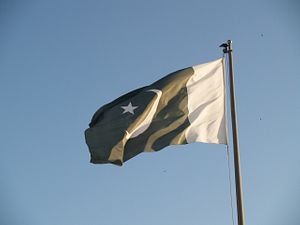Last week, a special investigation team in Pakistan disclosed that Uzair Baloch, a powerful and feared gangster in the city of Karachi, worked with politicians and law enforcement officials to run a multibillion-dollar criminal enterprise.
Previously, a military court in Pakistan also found Baloch guilty of espionage and sentenced him to 12 years. Reportedly, Baloch spied for an Iranian intelligence agency and provided “secret information and sketches regarding army installations and officials to foreign agents.”
Baloch has remained in the Pakistani military’s custody for more than three years. His role in destabilizing Karachi and his relations with various political parties, particularly the Pakistan People’s Party (PPP), has been known for years.
Why then is there a sudden interest in his case again?
While the military has not made any major new revelations about Baloch’s role in Karachi’s politics, Pakistan’s ruling party is making a committed effort to start criminal investigations against politicians involved in destabilizing Karachi. However, the ruling party’s interest is hardly driven by a desire to see justice delivered in the case. Rather, the federal government is looking to make important political and constitutional gains by making an outcry about the incident.
To understand the Pakistan Tehreek-e-Insaf’s (PTI) motives, one needs to briefly look into Baloch’s connections with politicians from the province of Sindh. In 2014, a profile published by Dawn noted that Baloch “has been considered the political face of the Pakistan People’s Party in Lyari — a label the PPP is struggling to distance itself from.”
The profile also notes that “The PPP, which keeps its association with the Peoples Aman Committee non-committal, protected Uzair until 2012.” However, after 2012, Baloch developed political differences with PPP leadership. This forced the PPP into backing a military operation against Baloch’s gang in Lyari, which “insiders say was based on completely political reasons.”
The case has become more controversial after the ruling party’s maritime affairs minister, Ali Haider Zaidi, made a recent disclosure that the PPP-led Sindh government “manipulated the original report,” which is critical of the party’s links with Baloch. The PPP denied all allegations and instead questioned the authenticity and source of PTI’s report.
At this point, the row between the two parties over Baloch’s matter can only be linked with another important issue currently making rounds in the country’s politics: the fate of the 18th constitutional amendment. The amendment, which was passed into law in 2010, offers provinces a comprehensive autonomy and a major share of the central government’s annual budget.
For a long time, the PTI’s federal government has been planning to review the 18th amendment, raising fears of shrinking provincial autonomy. From the outset, the PTI government has opposed the amendment. The federal government cannot continue its policies if they clash with the vision of any provincial government.
The PPP maintains that it will not allow any changes to the 18th amendment, which essentially forms the basis of the party’s rule in Sindh. For a long time, the PTI has tried to gain electoral support in Sindh province. Any such support can only come at the expense of the PPP support base in rural and urban Sindh, including Karachi.
Currently, the funds and administrative autonomy the 18th amendment provides to the PPP in Sindh are the only lifeline that the party is left with after losing its political base outside Sindh province.
Primarily, the effort to bring changes to the 18th amendment is being spearheaded by the Pakistani security establishment via its representation in the civilian government. Reviewing the security establishment’s view of the 18th amendment, Suhail Warraich notes that “The general feeling in the establishment is that the 18th Amendment has become a major cause of unbalance between Federation and the provinces… The perception is that the amendment has changed Pakistan from a Federation to confederation.”
Pakistan’s current hybrid civil-military regime is pulling out all stops to undo the constitutional amendment. Arguably, PPP’s leadership is the only political opposition that the military has not been able to deal with or come to terms. A newly published book, Pakistan Political Parties: Surviving Between Dictatorship and Democracy, notes that “Despite the PPP’s inability to recreate its past powerful aura, the military remains suspicious of the party, in part due to the PPP’s role in passing the 18th amendment to the 1973 constitution. The amendment invoked the wrath of the Army chief Qamar Bajwa, who described it as big a problem as Sheikh Mujeeb’s six points.”
Arguably, for the security establishment, the current government in Pakistan represents the best opportunity to undo the amendment since its enacting. The national security establishment couldn’t change it during the tenure of last two governments. And if it can’t do it now, when it has the support of the elected government, it should be taken as a sign of weakness in the face of growing resistance from democratic forces.
The change to the amendment can only be brought if the PPP offers its constitutional support in the parliament. In this regard, Baloch’s association with the PPP’s leadership in managing Karachi’s criminal landscape offers the current ruling party and the military an ideal opportunity to weaken the party further.
In the coming days and weeks, Baloch’s case will become central in the Pakistani politics. The case may end up deciding the fate of a constitutional amendment that remains the only defining achievement of the civilian forces during the last decade.

































